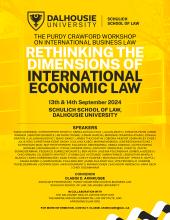The "Special and Differential Treatment Reform in the WTO" by Aniekan Ukpe offers a thorough exploration of the complexities of trade law within the World Trade Organization (WTO), with a particular emphasis on the concept and reform of Special and Differential Treatment (SDT). Ukpe's work is both timely and relevant, addressing some of the most contentious issues in the multilateral trading system. At its core, the book focuses on the critical theme of reforming SDT provisions and practices within the WTO, offering a detailed examination of the current challenges and shortcomings inherent in these provisions.
Ukpe conducts a thorough review of existing reform proposals, critically analysing their effectiveness and identifying gaps that have impeded meaningful progress. A central element of his work is the introduction of a unique, rules-based approach he terms "differentiated differentiation." This method advocates for defining agreement-specific or provision-specific criteria for SDT, ensuring that eligibility is based on objective and measurable factors related to a country’s capacity to implement specific rules, rather than on broad country categorization. The book goes beyond conceptual discussion by demonstrating the practical operationalisation of the approach, using the WTO’s customs valuation agreement as a case study.
